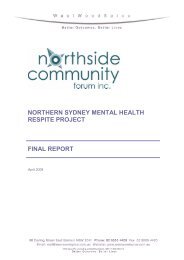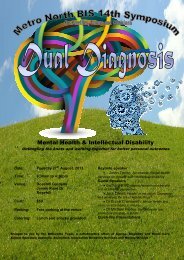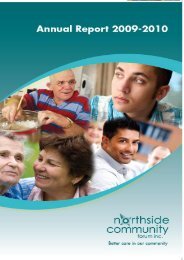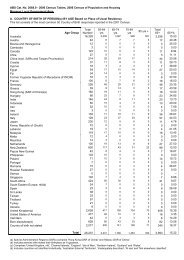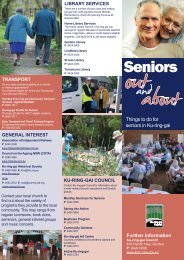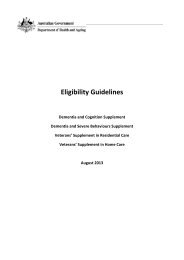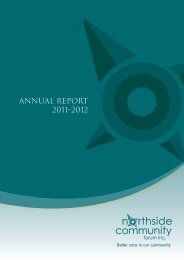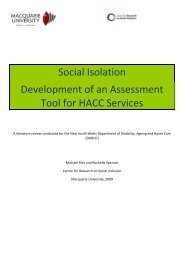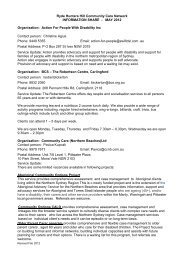Guidelines for field staff to assist people living in ... - Housing NSW
Guidelines for field staff to assist people living in ... - Housing NSW
Guidelines for field staff to assist people living in ... - Housing NSW
Create successful ePaper yourself
Turn your PDF publications into a flip-book with our unique Google optimized e-Paper software.
with Care and Hous<strong>in</strong>g <strong>for</strong> the Aged program and non-governmen<strong>to</strong>rganisations are sometimes able <strong>to</strong> <strong>for</strong>ge an <strong>in</strong>itial relationship withthe client and obta<strong>in</strong> their consent <strong>to</strong> arrange medical appo<strong>in</strong>tments.Assess<strong>in</strong>g capacity. An important question <strong>to</strong> be addressed fromthe outset is whether or not Mr A. has the capacity <strong>to</strong> decide whetheror not he needs <strong>to</strong> receive further medical treatment (e.g.medications, hospitalisation, <strong>in</strong>vestigations) and rema<strong>in</strong> <strong>in</strong> his currentaccommodation. He needs <strong>to</strong> be able <strong>to</strong> understand the optionsavailable <strong>to</strong> him and the potential benefits and risks associated witheach of these.Environmental and public health assessment. Severe domesticsqualor can present the follow<strong>in</strong>g significant health risks <strong>to</strong> theoccupant, <strong>to</strong> neighbours and <strong>to</strong> the local community: fire from theaccumulation of large quantities of flammable material; rodents andother pests; and the spread of disease associated with lack of runn<strong>in</strong>gwater or lack of sewage. If these concerns are apparent <strong>in</strong> Mr A.’scase, it would be necessary <strong>to</strong> notify Environmental Health Officers(EHOs) with the local council.Clean<strong>in</strong>g. Clean<strong>in</strong>g is often difficult <strong>to</strong> organise and <strong>to</strong> pay <strong>for</strong>. If MrA.’s <strong>liv<strong>in</strong>g</strong> conditions are extreme and there are concerns aboutexposure <strong>to</strong> human waste, body fluids, excretions and an <strong>in</strong>fectionrisk, ‘<strong>for</strong>ensic’ clean<strong>in</strong>g may be required. The local council may beable <strong>to</strong> provide contact details <strong>for</strong> local clean<strong>in</strong>g services and <strong>assist</strong>with removal of property and rubbish. In milder cases, with less<strong>in</strong>fectious risk, particularly if Mr A. were voluntarily accept<strong>in</strong>g<strong>assist</strong>ance, some NGOs (such as Mercy Arms or the Brown Sisters)may undertake some of the clean<strong>in</strong>g themselves. A small amount offund<strong>in</strong>g is available from the Department of Age<strong>in</strong>g, Disability andHome Care (DADHC) <strong>to</strong> broker clean<strong>in</strong>g services <strong>in</strong> some cases.What happens if Mr A. persistently resists assessment and/or<strong>in</strong>tervention?Should Mr A. be cont<strong>in</strong>ually unavailable <strong>for</strong> assessment and theconcerns <strong>in</strong> relation <strong>to</strong> his health and <strong>liv<strong>in</strong>g</strong> conditions persist, thereare several ways <strong>in</strong> which his case could be dealt with. These arelikely <strong>to</strong> be <strong>in</strong>fluenced by which service has had the most<strong>in</strong>volvement. In Mr A.’s case, this would be mental health servicesand the local council. A jo<strong>in</strong>t approach (tak<strong>in</strong>g as much care <strong>to</strong>ma<strong>in</strong>ta<strong>in</strong> confidentiality as possible), with one service tak<strong>in</strong>g on therole of the ‘lead agency’ and identify<strong>in</strong>g a coord<strong>in</strong>a<strong>to</strong>r or ‘key worker’,is probably the ideal. Cont<strong>in</strong>u<strong>in</strong>g ef<strong>for</strong>ts should be made <strong>to</strong> engageMr A. and conv<strong>in</strong>ce him <strong>to</strong> accept help voluntarily.If Mr A. cont<strong>in</strong>ues <strong>to</strong> resist, legal authorisation <strong>to</strong> enter his home <strong>to</strong>conduct an assessment, is required. If there is evidence of a likelymental illness, mental health services could apply <strong>to</strong> the local court <strong>for</strong>authority <strong>to</strong> conduct an assessment under the Mental Health Act. This54




